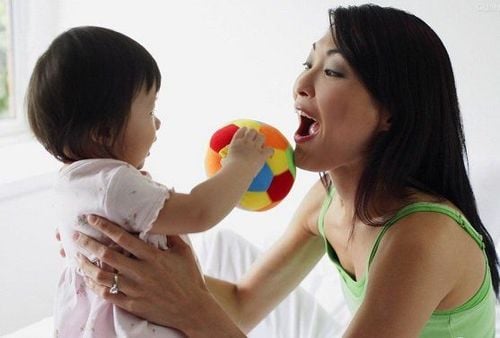This is an automatically translated article.
The article is professionally consulted by Master, Doctor Quach Thuy Minh - Pediatric Psychiatrist - High-Tech Unit for Treatment of Cerebral Palsy and Autism - Vinmec Times City International Hospital.If our child is born healthy and intelligent, we also have a hard time, but if it is a sick or disabled child, it is a great challenge for parents. Especially having a child with autism (a disability that is considered the most difficult), the effort parents need to put in must be many times greater.
In order to help a child with autism recover, parents not only need to feed and clothe them, but also have to be teachers and therapists. Because parents are the ones who understand their children the most and spend the most time with them.
1. The role of parents in autism treatment
Early intervention program for children before the age of 5 includes child education and family counseling. For children, it is necessary to influence through methods such as: Multi-sensory conditioning, teaching fine and gross motor skills, speech therapy, behavior management, play therapy, teaching independence skills, social skills.Managing children's behavior is a difficult problem because children are hyperactive, do not like to learn, just always follow their own whims. Therefore, parents should pay attention to understand the child's intentions and suggest that the child express himself in words or gestures. Understand the reasons for the child's tantrums to avoid repeating the abusive situation, ignore the child's tantrums, say no to misbehavior or punish by sitting in one place, transfer the child's excessive free activities to other activities. purposeful activities such as putting away toys, doing errands, kicking a soccer ball, riding a bike, etc. Let your child do things that are easy to do and then gradually increase the difficulty, always praise the child every time he tries, know Children like something to use as a reward to encourage them to perform a task.
For older children, it is necessary to have a comprehensive child development program conducted at home as well as at school: Teaching children about cognition, adaptive activities, attention enhancement, sensory activities, and motor activities. , language, memory, organization, learning, social skills, visual-spatial skills and general activities to help children adapt to life and integrate into the community.
Currently, there is still no specific drug to treat autism, but only medication to treat symptoms associated with hyperactivity, anger, aggression,...
There are different models that parents have can refer to children for early intervention. If the child is assessed as severely autistic, the child should be enrolled in a special education center or rehabilitation department for a period of time, and then preschool can be combined with center intervention. hourly. If children with mild autism can attend kindergarten and individual intervention on an hourly basis. Some parents can afford to invite teachers to their home to teach their children so that they can gain more experience.

Limit children to watch TV, not to play video games. must often talk to the child, call his name and look him in the eyes. Teach children communication gestures. Teach children to understand words, teach pronunciation, teach speaking. Let your child play with other children. Use toys in a variety of ways, playing things one at a time, taking turns and taking turns (e.g. push the ball, push the car, play with puzzles). Always encourage praise. Teach children independent skills such as self-feeding, dressing, washing hands, going to the toilet, etc. Applying multi-sensory conditioning methods to exercise children. If the child responds appropriately to reality, it proves that teaching children has good results.
2. Tips for parents of children with autism
Quickly overcome the "shock" after knowing that your child has autism, regain spirit, accept reality. Adjust life, arrange housework, coordinate with professionals, gain experience and knowledge to teach children. Buy and make your own toys and interventions.

Persevere, intervene to teach children anywhere, anytime if possible. Avoid boredom and impatience. Always showing love for the child makes the child feel safe, but not for the child and always encourages the child to be as independent as possible. The living environment layout has a clear, stable and safe structure. Regularly send children to be examined, periodically evaluated, and coordinate with experts to establish appropriate programs to teach children. Not hiding guilt but actively allowing children to integrate into the community, informing relevant people about the child's condition. Group activities for parents with autism to share.
Please dial HOTLINE for more information or register for an appointment HERE. Download MyVinmec app to make appointments faster and to manage your bookings easily.














